Text

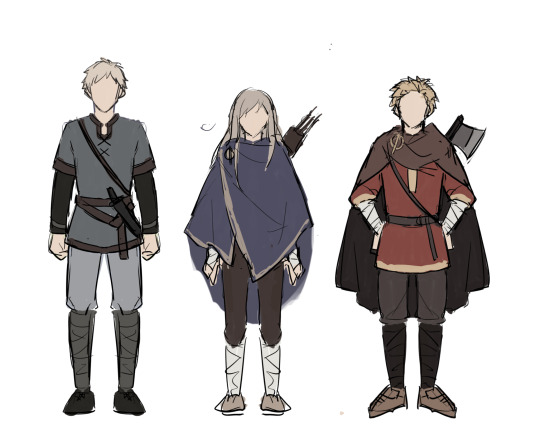




Viking Trio - Fantasy Costume!
#hetalia#aph norway#aph denmark#aph sweden#aph nordics#aph viking trio#aph#hws nordics#hws sweden#hws denmark#hws norway#long haired nor hellooooooo#full animation trailer when
474 notes
·
View notes
Text

135 notes
·
View notes
Text

Hetalia Musical 2025
#aph#aph nordics#aph sweden#aph denmark#aph norway#aph finland#aph iceland#hws#hws nordics#hws sweden#hws denmark#hws iceland#hws finland#hws norway
494 notes
·
View notes
Text
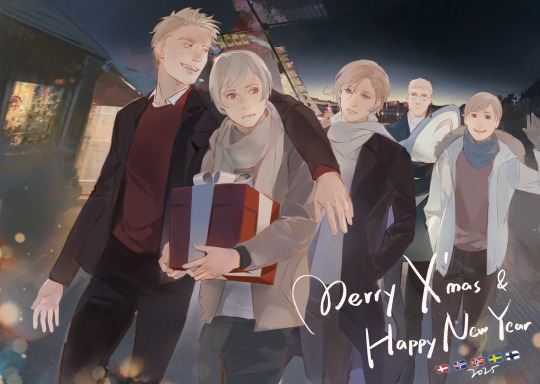
happy new year guys!
#hetalia#aph denmark#aph iceland#aph norway#aph sweden#aph finland#aph nordics#hws nordics#aph#hws finland#hws iceland#hws norway#hws sweden#hws denmark
396 notes
·
View notes
Text
I've been thinking about the Nordics' view on their immortality. How would they feel about it based on their character and experiences?
Björn (Sweden) seems to be the most keen to live like humans. He wants a domestic life, living quietly somewhere in the countryside, willing to guide and raise younger nations, and focusing on his crafts. He just wants to live in peace. Maybe he'd be willing to give up his immortality status if that was possible; if it meant he could live the kind of life he wanted to without constant outside intervention (from people and other immortals). Perhaps he feels little joy from his status, i.e. representing people or taking the responsibility of such duties. It's a task that he can never fulfill; managing to please everybody. He could have also felt alienated from others throughout his life, never really fitting into any period. So would he feel a deep connection with people to begin with? Perhaps he just wants to live on his own accord, somewhat self-sufficiently, not owning anything to anybody.
Meanwhile, I think Magnus (Denmark) would have a more positive experience with his immortality. He loves his friends and family, always looking out for them. Maybe being surrounded by other immortals makes him feel less alone in his world. After all, could humans ever relate to his life and experiences, since they can't even comprehend what he has gone through? So it'd make sense why he'd seek family and companionship from other immortals. And it'd make sense for him to be terrified of death and losing someone important to him - so I don't think he'd wish to be a mortal. In a way, he enjoys his immortality status. He probably loves his people and feels a sense of pride in representing them.
Sigurd (Norway) however, has had horrible experiences with other immortals, so I think he'd pursue some form of meaning and comfort from his job; representing something he values. He wants to focus on things that are important to him, finally fulfilling his own needs and not being restricted by others. And his position or job would definitely strengthen his sense of self and purpose in life. While he feels limited by his responsibilities at times, he also feels seen. He's finally important and valued. Perhaps he's neutral on his immortality, recognizing the positives and negatives at the same time.
Perhaps for Timo (Finland), the question is complicated. He's an alien not only among people but among his peers as well. Does he really fit into either world? Perhaps his thoughts about immortality are tied to his role and place throughout his life; who he actually is and what he actually wants. He's torn by the whole question, not being able to make his peace with it.
And finally, Eiríkur (Iceland) is rather different from everyone because he has always been so isolated. Thus he has always been alone with these big questions. Who is he and what he's supposed to do? Why he specifically is different than the rest? I think he could have a different impression of immortality because no one has ever told him what it's supposed to be like - he has come to these answers based on his own experiences. Perhaps he's closer to people than most other immortals. Instead of his peers being there, the presence of humans was the only constant in his life. He learned to accept that they'd pass on at some point, but there'd always be new people to take their place. He has accepted death as part of their existence and therefore he doesn't run away from it. It has undoubtedly given him a twisted sense of humor but also healthy optimism and hope about things figuring themselves out.
#hws nordics#hetalia#aph#aph norway#aph denmark#aph nordics#aph sweden#this is gold#truer words have never been spoken
124 notes
·
View notes
Text

Oops my hand slipped.
48 notes
·
View notes
Text
Sorry for being dead I was in Florida.

#so anyway I went to epcot#the heat was awful but we got to see some lovely knockoff bunads and a cast member complimented me on my pronunciation of riskrem so#all around fantastic experience#10/10 would (probably not) spend 260 bucks again#also someone should definitely do a series about nations with weird summer jobs#hetalia#aph norway#aph#hws norway#aph nordics#hws nordics
220 notes
·
View notes
Text

just chatting with @lumierew and @cat-with-a-tie then this thing came out
translate:
Swe: (your insane step-father)
Nor: (yandere-succubus)
Ice: “ The wind can't reach me, nobody can catch me!”
Den: (you know, the Slaughter House)
Fin: (just a regular alcoholic Finn chilling)
#hetalia#aph sweden#aph norway#aph denmark#aph finland#aph iceland#aph nordics#2ptalia#2p nordics#BITE THE CARPET DARLING IM GOING IN DRY
125 notes
·
View notes
Text
Re: Sweden, Norway, and Denmark's Japanese dialects in Hetalia (and potential implications to their characterization) (with briefer notes about Fin and Ice)
Thanks to @nordickies for being the spark that lit the fire to write this post. This information also personally has informed some of my personal takes on the Nordic 5 for over a decade now, so I hope it is useful. A lot of this was more common knowledge back in the livejournal days of the fandom.
Disclaimer: my Japanese is limited and by no means do I claim to fully understand all of the cultural complexities surrounding this topic. I will try, where I can, to back up my claims with at least somewhat credible sources especially since I am someone who is not Japanese in origin either ethnically or culturally, however I DO know more than the average person would because I have lived in Japan, was exposed from my practical birth to the culture and language waaay more than is typical due to me living overseas, and I have studied the language on an elementary level in several academic settings. I am by no means an expert (I am a wildlife biologist by trade), but all of this is done in good faith, and if you do know more than me (especially since I am limited in my ability to get access to academic texts right now — nor am I going far out of my way to find those, as this is a meta post about Hetalia of all things and I am not going to do a whole giant thesis about this for one post), feel free to correct me and/or send me further resources, as I want to convey as accurate of information I can as possible. Part of my motivation for making this post was to spur conversation and hopefully have others who know more than me contribute to the ongoing conversation, to which, I encourage those who read this post to check the notes for any further updates. Another note that I also do not originate from a Nordic country, so there may also be additional layers people from those countries may be able to add. Thanks! Let's begin.
*********************************************************** Like several characters in Hetalia, the Viking Trio speak in unique Japanese dialects that further make them distinct and characterize them in Japanese. Sweden speaks in a Touhoku dialect, Norway in the Tsugaru dialect (which is a specific type of Touhoku dialect), and Denmark speaks in Ibaraki dialect. The Ibaraki dialect is sometimes seen as belonging to the Touhoku dialect group or the Kantou dialect group, and the classification is debated. Generally, Touhoku accents are characterized by slow speech, the slurring of words together, and the muttering of words — as well as being associated with rural country folk (Kumagi 2011, direct PDF download). This dialect is often translated into English as a redneck/hick accent and drawling speech — and as those who speak it are often characterized or stereotyped as unintelligent folks from out in the sticks. Kumagi cites Inoue (1977) as saying that Touhoku dialects are "degraded at the bottom in the Japanese language" scoring low on "intelligence and emotion-related associations." One American English rough equivalent (not localized, but in terms of reputation in U.S. culture) by my best estimations would likely be Appalachian dialects, which are also stereotypically characterized as being a hillbilly, unintelligent, and rural accent also featuring drawled speech and often truncated speech (source). Like many Touhoku dialect speakers in Japan, Appalachian dialect speakers often hide, mask, or reduce their accent, especially if they relocate someplace outside Appalachia, in order to seem more credible to others, as it is generally seen as an “inferior” dialect of American English in the wider culture (personal/family lived experience, but also a good radio piece on it here). The other way Touhoku dialects are translated in media are as Upper Midwest or Northern Plains dialects of American English (not the most credible source, but a lot that is on here that I can confirm to be correct). This characterization is likely a more accurate candidate for the Nordics (and may be why Hima chose this dialect group for them), as many immigrants from Nordic countries settled in the Upper Midwest/Northern Plains (source, personal experience living in this region for a lot of my life). Touhoku dialects are also a more northern dialect group, which geographically coincides with the Nordics being, well, northerners!
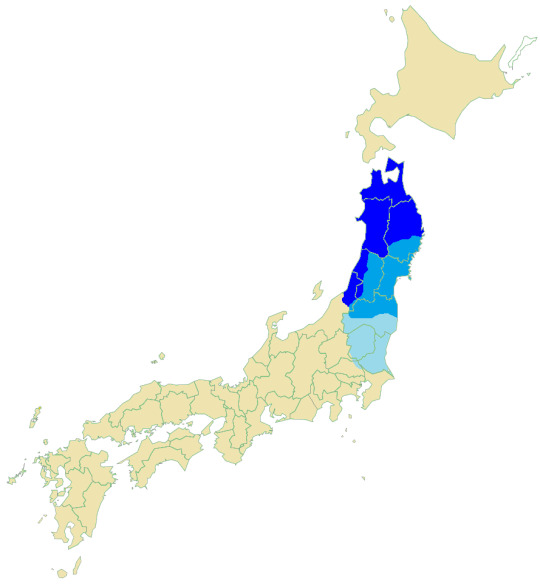
(Map of Touhoku dialects regionally) I have not been able to find any information re: if Sweden speaks any particular type of Touhoku dialect (or if it is more broad), but I will talk a bit about how his speech was transliterated in early scanlations before moving on to the other two. Because of how slurred/more truncated/less intelligible Touhoku accents generally are (and remember, Den/Nor/Ice did not make their appearance until well after Swe/Fin did!), likely early translators decided to chop off letters/make Sweden's speech seem less intelligible in order to convey that to readers. Unlike Norway and Denmark, Sweden also often speaks in shorter sentences/phrases in Japanese, and given that Finland canonically says "it's just hard to communicate with him" (see Running Away with Mr. Sve) that is also likely why early Hetalia scanlators before official translations of the comics were available (note: god this is making me feel old as hell) made the decision to give him the speech patterns that they did, and that ended up spreading through the fandom. When the other Nordics with their regional dialects dropped, given how Sweden’s vocal trait got translated into English and then fandom ran with it to varying degrees of intelligibility, I think the decision was made to not translate Norway the same way to cause less trouble in fanworks, while the Ibaraki dialect did influence how Denmark was translated (more on that below.

Norway speaks in a very particular Touhoku-family dialect within the series that is generally not well-reflected outside of the source material at all. The Tsugaru dialect is spoken in the northwest part of the country, specifically in the western part of Aomori Prefecture — Tsugaru dialect is a particularly unusual dialect, even by Japanese dialect standards, by being one of the most difficult dialects in Japan to understand (source). Even within Japan itself, people speaking this dialect often have to be subtitled on television for other Japanese audiences to understand, and there have been occasions where the dialect has been displayed on television to marvel at how strange and unintelligible it sounds to other Japanese speakers. Sometimes speakers of this dialect have been characterized (or mischaracterized for comedic effect) as French in Japanese because the odd sound and unintelligability of the dialect (source). Kumagi (2011) also states that "[...] within the Tohoku [alternate transliteration of Touhoku] dialects, Aomori [prefecture in which Tsugaru is spoken] dialect is at the bottom [of the hierarchy]," meaning that even among the already disrespected Touhoku dialects, Tsugaru belongs to the worst of the bunch in terms of reputability and respectability in Japanese perceptions. The Tsugaru dialect is a source of fascination, comedy, and disrepute/low standing all at the same time. While we don’t know why Hima selected Norway to have this dialect, I have a few proposals. First, this gives him a similar flavor to the other members of the Viking Trio while keeping him distinct — while Ibaraki is a more southern dialect geographically (for the region), Tsugaru is spoken both more north and more west than it. So if you map their dialects out on a map, their geographical location to each other also somewhat resembles their actual locations as nations to each other in the Nordics! Which is neat!
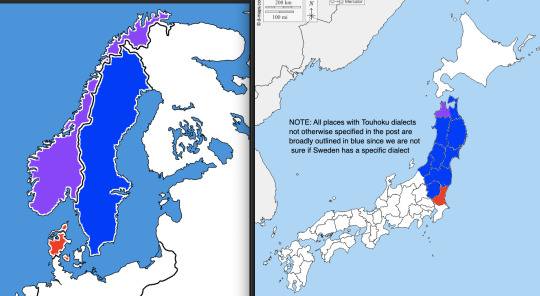
Second, Hima characterizes Norway has being slightly otherworldly and unusual largely due to his fairy-friends and such. But I also think that he likely chose Tsugaru for him not only because that makes him seem like he’s out of this world, but also because Japan is kind of fascinated by that dialect in particular despite not holding it in high regards by it too — sure, it is a hick accent, but it is an interesting hick accent. I think the fact that Japanese speakers sometimes liken the dialect to French is interesting specifically because of how Japanese people often view the French — French culture something that is often romanticized and idealized, and given how Tsugaru dialect can sound French-ish to Japanese speakers, that may be why Norway is kind of designed as the “pretty boy” of the trio by the fandom? In the same way that “Paris Syndrome” is a thing, where Japanese who go to France are often shocked at how their idealized version of France does not live up to the realities of the country (trust me it's real there is a wikipedia page lol), I think you can argue that in-universe Norway can be seen in a lot of different ways depending on the preconceived notions of how you view the dialect. If you view it as French-like and think it sounds interesting, you may find it alluring/beautiful. If you think it is crass, you'll look at it with disdain and disgust. If you think it just sounds silly and stupid, it is. If you think it is nostalgic (as Kumagi states that this is the only positive association this dialect has) and has a close association with nature/pastoral life because of that, it is. I think Norway in canon is characterized on all four of those axioms at the same time (if you really wanna pull canon receipts I will at another time) which makes this make a lot of sense to me as to why that dialect was chosen for him. Third, I think that given Norway was largely the worst off of the three kingdoms for most of history, it makes sense to give him the worst accent in terms of reputation/status out of all of them, too. Note: specifically, re: how Norway uses "brother" in Japanese is also interesting when referring to Denmark. What he is saying is "anko" (あんこ), which literally means "young man/eldest son" directly translated and is specifically only used to mean that in northern Japanese dialects. A good way to put it is it is like people in the U.S. use "bro" as a catch-all term for a similar-aged guy you are trying to get the attention of kind of informally, in the same way you can say "nii-san" to both mean "older brother" and also "guy who seems older than me I am addressing informally" I guess?? Funnily enough, which I didn't know until researching shit, it apparently also means bottom (homosexual) in prison slang??? Which may or may not be intentional I guess on Hima's part, and could also influence your characterization of Norway as a result. Finally we move on to Denmark. The Ibaraki dialect is characterized by number of things, but for our purposes I think that the two most important traits are the general lack of polite speech and the slightly faster rate of speech (unfortunately, my only written sources I can point to are wikipedia and TV tropes again, but I have heard this orally from someone a long time ago - I looked for more credible sources but couldn't find any easily). Because of it being debated as to whether or not is a true Touhoku dialect or if it is actually a Kantou (more southern/eastern) dialect, I think you can also argue that makes sense given Denmark is kind of the "gateway" into the heart of Europe geographically. People have generally translated this as him being excitable and more casual in the way he communicates to other people. I have been able to find less resources on this particular dialect and how it is perceived culturally, so I will sadly have to leave it at that, but from my understanding he is generally translated appropriately in the manga from what I have seen, with the -in' instead of -ing and ya instead of you to have it seem more relaxed/familiar/casual.
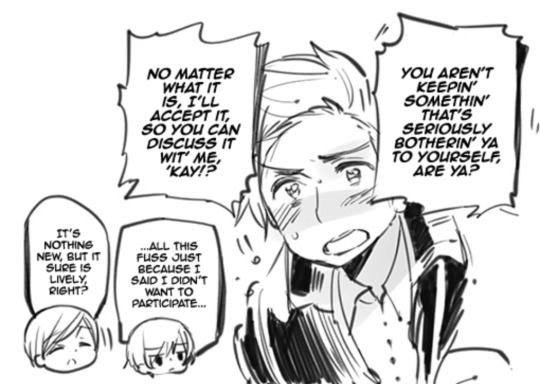
Final notes on Finland and Iceland: I cannot confirm this personally, but from what I can hear from Finland, it sounds like he speaks pretty standard Japanese to me, but take that with a grain of salt since I am not the expert here. Which, dialect-wise, places him as the odd person out (which fits with Finnish being the linguistic outgroup of the five) and also puts him as the relatable “stand in” for Japanese people learning about the Nordics — reminder he is the one who introduces them all in that one comic (see The Nordic 5+a) and even earlier comics (see Running Away with Mr. Sve), and we’re viewing the Nordics from largely his perspective). Since Finland in this series is largely characterized (and often deemed a poor stereotype by Finns) because of the Japanese perspective on Finland/Finns, it makes a lot of sense Hima used him kind of as a self-insert for Japanese readers/viewers to understand the Nordics from, as of the Nordic nations, Japanese folks are likely going to have the strongest familiarity/connection to Finland because of the Moomins. Please take the following information about Iceland with heaping grains of salt, but from a memory, I believe he also speaks the Tsugaru dialect, at least some of the time???? This makes sense he shares the Tsugaru dialect with Norway, as he’s Norway’s in-canon sibling, but I have a vague memory of a meta post I cannot 100% confirm or deny exists re: him only speaking the dialect/the dialect coming out more when he’s alone?? This following is speculation since I cannot confirm/deny that right now with my current abilities, but if it is true, would also be an interesting level to his character and make sense — it puts further distance between him and Norway if he purpsefully doesn’t speak the same way as his brother when his brother is present, and it also is reminiscent of my own experience living with people with discriminated accents who then mask their “less desirable” dialects in their teens/20s so they don’t get discriminated against as they move up in the world. Kumagi (2011) states that "Therefore, young female native speakers of Tohoku [alternate transliteration] dialects feel ashamed of their dialects and hesitate to speak them in big cities such as Tokyo. They are made to feel inferiority complex about their dialects, which are stigmatized as unfeminine". Since Iceland is very much characterized as a teen in canon, I think that this makes sense to do in the broader context of Hima’s choices. The specific reason as to why I state that I believe he speaks Tsugaru some of the time but not always is because there are some panels he speaks without it and some where he does seem to have an accent (HWS Chapter 112, relevant screencap below, this is the only time he speaks like this from what I can find in scanlations/translations, but it has to be a deliberate choice). Would love more info on this from someone who knows more about Japanese than I can do.
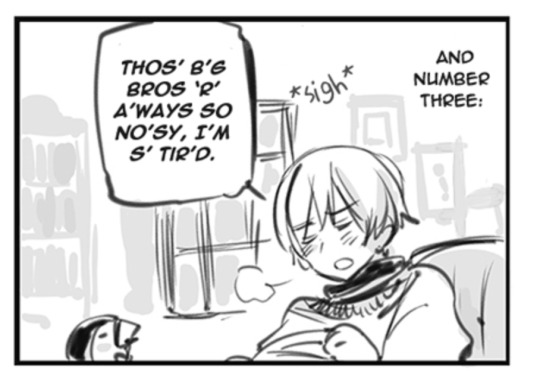
Again, please check the original post and/or notes for any future additions that I will add/edit accordingly (with notes as to where/when that happened) if any other relevant information surfaces, but I hope that was at least a little informative and interesting to read. I consulted a bunch of other resources too (read a bunch of papers I could find online), but a lot of those I read several months ago and no longer can find :x otherwise I would list them here.
Let me know if there are any typos/things are unclear, b/c holy shit this took a lot more effort and time for me to write up than I thought it was going to, and I am too tired to proofread it after spending several days on it. X_X
#hws norway#hws denmark#hws sweden#hws nordics#aph nordics#hws iceland#hws finland#INJECT THIS INTO MY VEINS
123 notes
·
View notes
Text
Wip
The Handmaiden movie poster parody

#aph finland#aph sweden#aph denmark#aph norway#hws finland#hws norway#hws sweden#hws denmark#the handmaiden#hetalia#asjdfhxjskslsla thank you thank you thank you#this is life
263 notes
·
View notes
Text
Thank YOU for having me up on the Norwegian mountain ✨💜
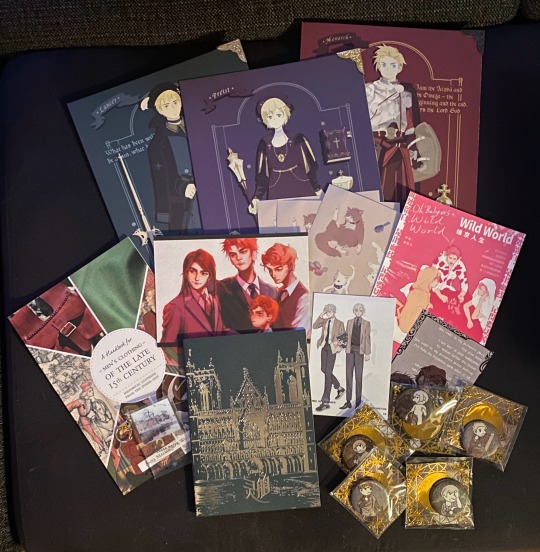
So many many thanks to @lumierew , @cat-with-a-tie , and @kleinzarohe for getting this amazing package to me up on the Norwegian mountain for my birthday last week! 💖 I don't think you know how much I appreciate it, you guys are incredible 🥺✨
51 notes
·
View notes
Text
Holy shit this is exactly what I’d imagined!! They look so miserable I love it 😭😭😭
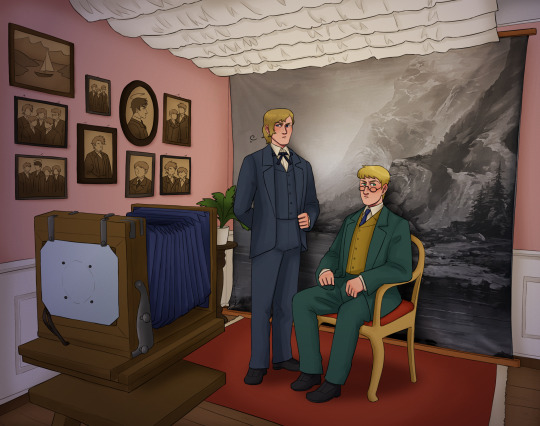
"Can you just imagine Norway and Sweden here, forced to take a picture together during their union in the 1800s??"
Or, something like that, is about what @cat-with-a-tie said just before requesting this exact scenario ✨
#hetalia#historical hetalia#aph norway#aph sweden#hws norway#hws sweden#sunor#my favourite ex husbands#five hours was nothing def would do it again#also what was that about struggling with backgrounds again??#you’ve got to be kidding me mate this is IMMACULATE#im working on the asks I swear#any day now 😔😔
228 notes
·
View notes
Text

#hetalia#aph#aph norway#aph nordics#hws nordics#hws sweden#hws norway#aph sweden#sunor#I LIVE#apparently I’m never getting tired of this joke#truly one of the divorces ever#aph england#hws england
239 notes
·
View notes
Photo
WTF THESE ARE ABSOLUTELY GORGEOUS WHAT DID I EVER DO TO DESERVE THIS.
@heta-hyjinks thank you so much this is amazing you’re amazing, exactly how I saw the scene in my minds eye wtf 😭😭😭
I’m so glad you enjoyed working on my silly lines!!!
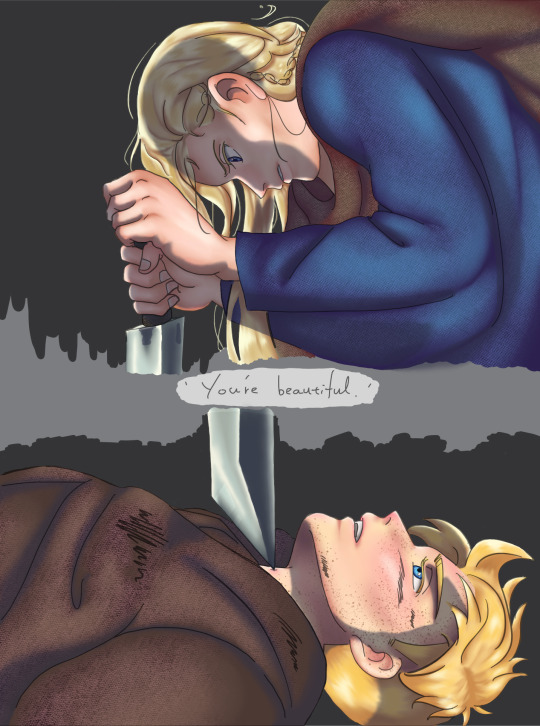
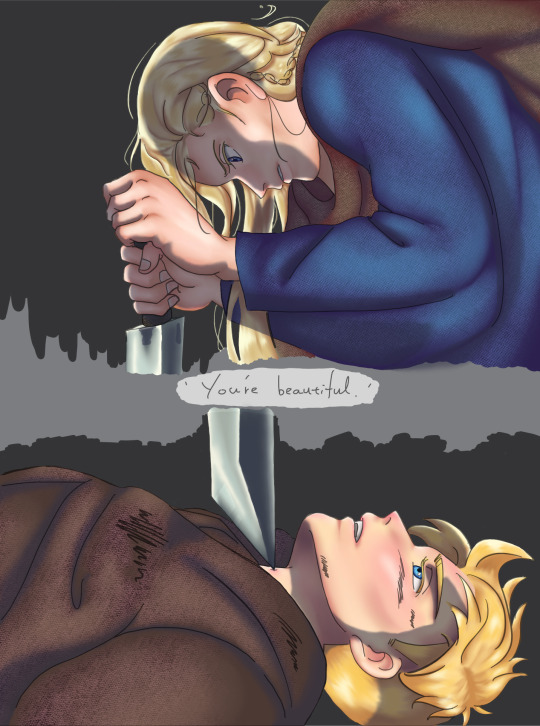
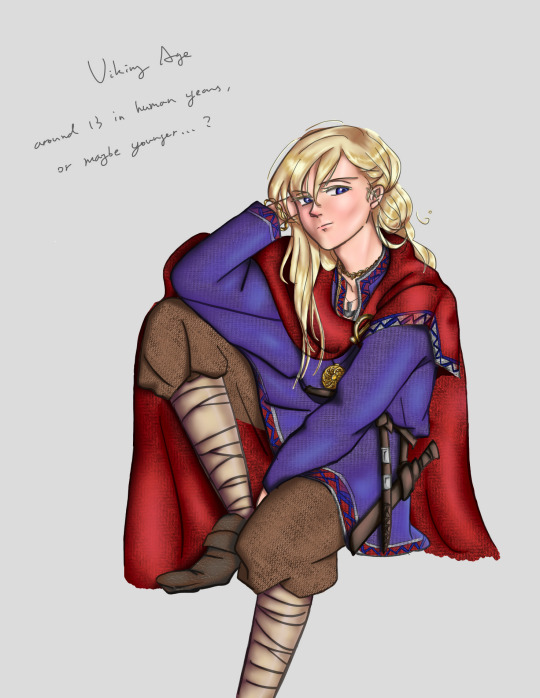
Finally finished these gifts for @cat-with-a-tie. They drew the line art, I did the colouring. :)
Original
#the lighting is stunning#wdym kinda iffy I see only perfection#btw a personal hell yeah for denmark wth freckles#although I don’t usually draw him with them but that’s just cuz I think it doesn’t go well wth my art style if I’ve got an art style at all#literally bawling look at my pretty babies#aph#hetalia#aph dennor#aph nordics
290 notes
·
View notes
Text
DenNor, traced from that scene in Princess Mononoke bc it’s a crime this hasn’t been done before.
You’re beautiful.
(first meeting, circa 800 AD)
Norway about six centuries later: ‘Damn really should’ve just killed him then and there huh.’


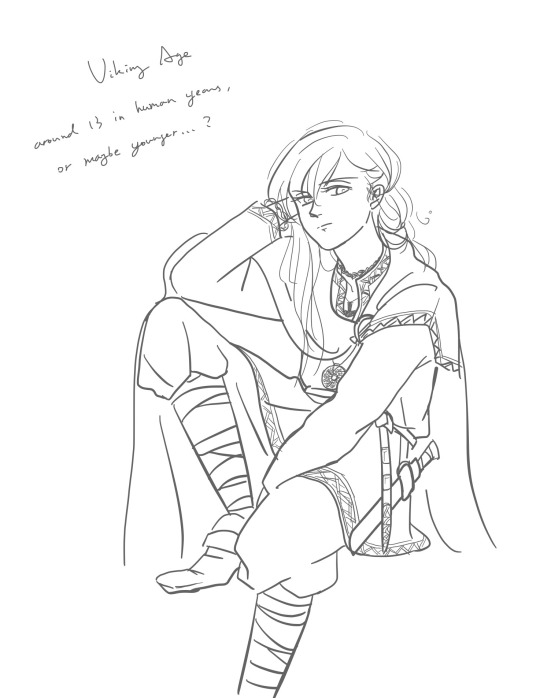
#dan’s hair is a nightmare and i’m not even bothering with historical accuracy anymore#i am once again asking anyone with a smidge of artistic talent to please colour the line art for me#warning: personal hc ahead#to an onlooker it may seem like dan was the one who fell in love with nor at first sight#but really it was the other way round#dan was just saying what he meant with no ulterior motive#like he saw something pretty and just went ‘oooh pretty’#nor on the other hand#oh he was down BAD#watch out nor that man’s gonna fuck your nine ways to thursday and not in the sexy sense of the word#hetalia#aph#aph norway#aph denmark#dennor#hws norway#hws denmark#aph nordics#hws nordics
162 notes
·
View notes
Text

another quiet day in the kalmar family
#I want this as a tapestry on my wall#hetalia#nyotalia#nyo norway#fem norway#aph sweden#hws sweden#aph denmark#hws denmark#swenor#sunor
386 notes
·
View notes





